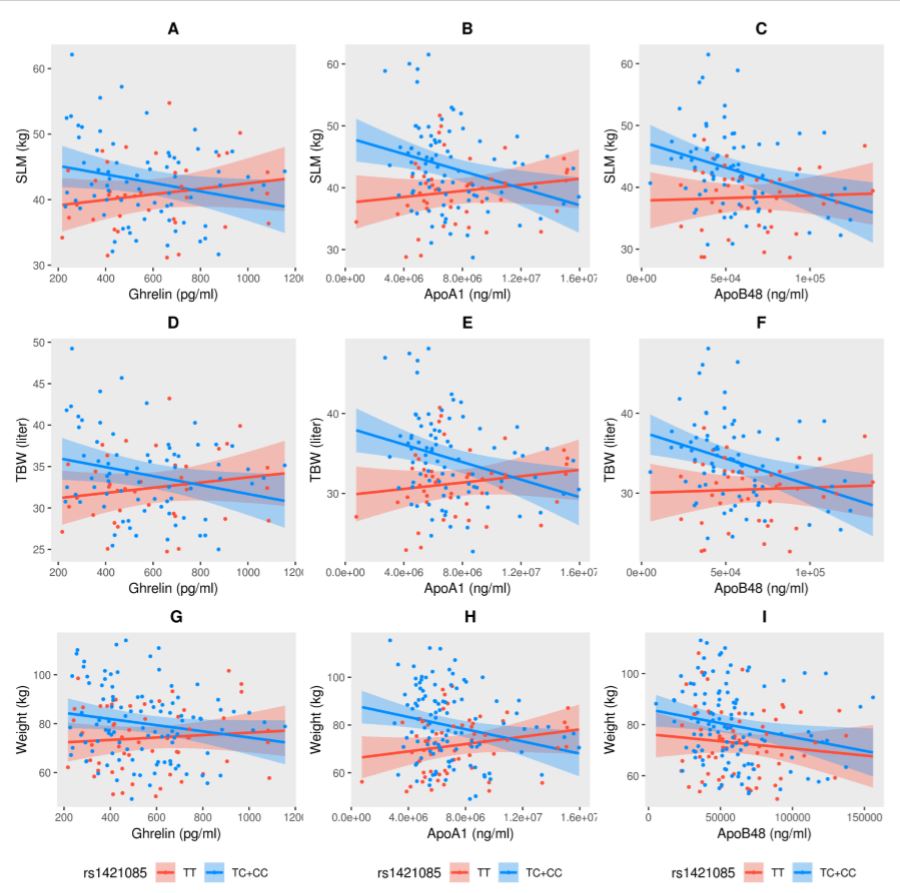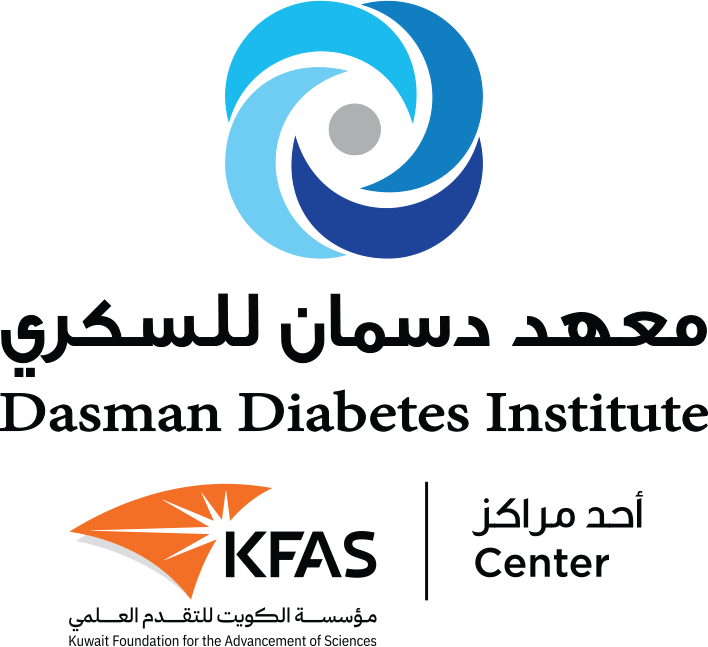
SPECIAL SERVICES FACILITY
In this issue of the newsletter, we will be highlighting the research being carried out by the Special Services Facility at DDI, led by Dr. Mohamed Abu-Farha.
RESEARCH HIGHLIGHT
Discover the latest research being carried out at DDI utilizing SNP Genotyping Pipeline
FTO SNP RS1421085 Increases Body Weight, Soft Lean Mass And Total Body Water Via Interaction With Ghrelin And Apolipoproteins.
Published on 19/10/2019
Prashantha Hebbar@, Mohamed Abu-Farha@, Anwar Mohammad, Fadi Alkayal, Motasem Melhem, Jehad Abubaker, Fahd Al-Mulla, Thangavel Alphonse Thanaraj*
As an application of the SNP genotyping pipeline the following paper has been prepared and submitted for publication. The post-oil era in the gulf countries witnessed a rapid increase in the prevalence of obesity in the region and as a result the GCC countries rank highest in the global obesity statistics amongst adults. Despite the high prevalence of obesity in the region, the Arab population has not been included in global genetics studies on obesity. The fat-mass and obesity associated (FTO) gene is a well-established obesity-susceptibility locus originally demonstrated in European population and subsequently replicated in Africans, South and East Asians and other populations. Despite the large number of genetic association studies on FTO, mechanistic details on the impact of the identified genetic variations are generally lacking. Novel approaches are needed to delineate the influence of genetic variants on the etiology of obesity, and this may be achieved through deep phenotyping of biomarkers, known to be involved in related biological processes, and by studying these genetic variants in various cohorts. We recently conducted a study, in which we evaluated the influence of the FTO rs1421085 variant on various anthropometric measures and obesity, inflammatory and cardiovascular biomarkers in a cohort of Kuwait Arab subjects. The choice of the rs1421085 was motivated by the observation that it has been associated with various anthropometry traits relating to obesity in various other populations. We find that the rs1421085_C SNP is associated with higher levels of body weight, soft lean mass (SLM) and total body water (TBW). The measures of these three traits were mediated by interaction between the genotypes (TC+CC) containing the effect allele and the measures of metabolic biomarkers. Thus, individuals with TC+CC genotypes demonstrated an increase in body weight, SLM and TBW with a concomitant reduction in the levels of Ghrelin, ApoA1 and ApoB48 (Figure 4). Whereas the association between FTO and ghrelin has been reported earlier, for the first time, to the best of our knowledge, we report associations between FTO and ApoA1 and ApoB48. In a similar manner, association of FTO with total body water and soft lean mass as opposed to other obesity traits (such as BMI and WC) are not frequent in the literature.

REFERENCES:
Dina, C., D. Meyre, S. Gallina, E. Durand, A. Korner, P. Jacobson, L. M. Carlsson, W. Kiess, V. Vatin, C. Lecoeur, J. Delplanque, E. Vaillant, F. Pattou, J. Ruiz, J. Weill, C. Levy-Marchal, F. Horber, N. Potoczna, S. Hercberg, C. Le Stunff, P. Bougneres, P. Kovacs, M. Marre, B. Balkau, S. Cauchi, J. C. Chevre and P. Froguel (2007). “Variation in FTO contributes to childhood obesity and severe adult obesity.” Nat Genet 39(6): 724-726.
Frayling, T. M., N. J. Timpson, M. N. Weedon, E. Zeggini, R. M. Freathy, C. M. Lindgren, J. R. Perry, K. S. Elliott, H. Lango, N. W. Rayner, B. Shields, L. W. Harries, J. C. Barrett, S. Ellard, C. J. Groves, B. Knight, A. M. Patch, A. R. Ness, S. Ebrahim, D. A. Lawlor, S. M. Ring, Y. Ben-Shlomo, M. R. Jarvelin, U. Sovio, A. J. Bennett, D. Melzer, L. Ferrucci, R. J. Loos, I. Barroso, N. J. Wareham, F. Karpe, K. R. Owen, L. R. Cardon, M. Walker, G. A. Hitman, C. N. Palmer, A. S. Doney, A. D. Morris, G. D. Smith, A. T. Hattersley and M. I. McCarthy (2007). “A common variant in the FTO gene is associated with body mass index and predisposes to childhood and adult obesity.” Science 316(5826): 889-894.
Hertel, J. K., S. Johansson, E. Sonestedt, A. Jonsson, R. T. Lie, C. G. Platou, P. M. Nilsson, G. Rukh, K. Midthjell, K. Hveem, O. Melander, L. Groop, V. Lyssenko, A. Molven, M. Orho-Melander and P. R. Njolstad (2011). “FTO, type 2 diabetes, and weight gain throughout adult life: a meta-analysis of 41,504 subjects from the Scandinavian HUNT, MDC, and MPP studies.” Diabetes 60(5): 1637-1644.
Li, H., T. O. Kilpelainen, C. Liu, J. Zhu, Y. Liu, C. Hu, Z. Yang, W. Zhang, W. Bao, S. Cha, Y. Wu, T. Yang, A. Sekine, B. Y. Choi, C. S. Yajnik, D. Zhou, F. Takeuchi, K. Yamamoto, J. C. Chan, K. R. Mani, L. F. Been, M. Imamura, E. Nakashima, N. Lee, T. Fujisawa, S. Karasawa, W. Wen, C. V. Joglekar, W. Lu, Y. Chang, Y. Xiang, Y. Gao, S. Liu, Y. Song, S. H. Kwak, H. D. Shin, K. S. Park, C. H. Fall, J. Y. Kim, P. C. Sham, K. S. Lam, W. Zheng, X. Shu, H. Deng, H. Ikegami, G. V. Krishnaveni, D. K. Sanghera, L. Chuang, L. Liu, R. Hu, Y. Kim, M. Daimon, K. Hotta, W. Jia, J. S. Kooner, J. C. Chambers, G. R. Chandak, R. C. Ma, S. Maeda, R. Dorajoo, M. Yokota, R. Takayanagi, N. Kato, X. Lin and R. J. Loos (2012). “Association of genetic variation in FTO with risk of obesity and type 2 diabetes with data from 96,551 East and South Asians.” Diabetologia 55(4): 981-995.
Loos, R. J. and G. S. Yeo (2014). “The bigger picture of FTO: the first GWAS-identified obesity gene.” Nat Rev Endocrinol 10(1): 51-61. Wu, C. and P. Arora (2016). “Noncoding Genome-Wide Association Studies Variant for Obesity: Inroads Into Mechanism: An Overview From the AHA’s Council on Functional Genomics and Translational Biology.” J Am Heart Assoc 5(7).


